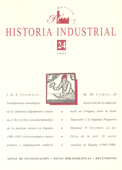The development of the textile industry in Uruguay between the Great Depression and the 1950s: entrepreneurship and economic policies
DOI:
https://doi.org/10.1344/rhi.v1i24.19484Keywords:
Textile Entreprise, Uruguay, Import Substitution, ExportAbstract
The research takes place in the transition period between the exports led growth and industrialization by substitution of imports. In this process the State fulfills a strongly regulating role, through exchange and foreign trade control, and redistributive policies intended to strengthen the domestic market. In this frame, the textile industry is one of the sectors of greater growth. The objective of the article is to discuss the performance of the wool textile industry in two stages of its development: the substitution of imports and the export openness during II World War and the postwar period. The research is based on a case study of the most important Uruguayan textile firm of this period: Campomar & Soulas. The analysis of the enterprise strategies and the policies of the State contribute to evidence the limitations of the imports substitution process and the difficulties to consolidate an export oriented industry.Downloads
Downloads
Published
How to Cite
Issue
Section
License
The author assigns all rights to the publisher. Creative Commons
The author who publishes in this journal agrees to the following terms:
- The author assigns all intellectual property rights exclusively to the publisher for the entire duration of the applicable intellectual property rights.
- The publisher will distribute the texts under the Creative Commons Attribution License, which allows others to share the work, provided that they acknowledge the authorship, its initial publication in this journal, and the conditions of the license.





